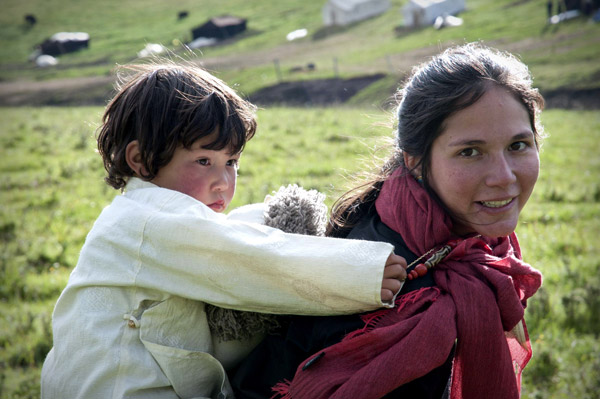Yaks for haute couture
 0 Comment(s)
0 Comment(s) Print
Print E-mail China Daily, November 19, 2013
E-mail China Daily, November 19, 2013
She is a social entrepreneur who wanted to do something to improve the lot of her father's people. The answer was always right under the noses of the nomadic Tibetans, as she tells Lin Qi.
|
Dechen Yeshi and her daughter at the Zorge Ritoma village in Gansu province. [Photo/China Daily] |
For generations, the villagers of Zorge Ritoma on the eastern edge of the Qinghai-Tibet Plateau had depended on raising yaks as their major source of income. Overgrazing, however, had gradually desiccated their livelihood as nomads.
Many of the able-bodied among them are abandoning the harsh realities of herding for a more tempting urban life. The village, filled with old people unwilling to leave and their grandchildren, seem doomed to face a bleak future.
That is, until they were told one day that the fine fibers from their young yak's may be the answer to a brighter outlook. Eight years later, the luxurious yak wool they are producing is keeping them warm and fed and linked, surprisingly, to the haute couture realm half a world away.
The woman who brought about these changes is Dechen Yeshi, 30, who manages a social enterprise called Norlha in Zorge Ritoma which hand-processes yak wool and sells it to fashion houses in Paris.
"We want to make sure that people who collect fibers and turn them into luxury products are local Tibetans," Yeshi says, "and that the profit would go solely to the villagers — a big challenge for the workshop, but that's also what sets us apart from other producers."
Born to a Tibetan father and an American mother, Yeshi majored in Asian studies and film at Connecticut College. Upon graduation, she decided to make a documentary about the land her father came from, with a "very romantic idea" of filming Tibetan lifestyles against a scenic background and promoting Tibetan culture to the world.
Her mother, Kim Yeshi, bought her a camera and entrusted Dechen with a more practical mission — collecting khullu, the dense fibers that were naturally shed by two-year-old yaks and had never been used by nomads.
Kim Yeshi had studied anthropology and Buddhism at university and spent 30 years in Asia researching local culture, with particular interests in textiles and handicrafts.
"People always talk about the cashmere as the precious wool, and camel wool. Although the yak also has wool, it had never been tested," the mother says.
"I thought it would be compelling to turn the yak wool into a new vision of life for the nomads."
When Dechen first arrived in Zorge Ritoma in 2004. She spoke to many young nomads, and they all wanted to be a part of the world outside, and "that fitted in with my mother's idea".
She decided that it made more sense to help that way.
"Making documentaries meant a lot to me but not as much to them."
She returned the next year with her brother Genam and they collected and shipped two tons of khullu to a textile factory in Kathmandu owned by her mother's friend. The end product was soft and warm and had a very good feel.
Inspired, the Yeshis founded Norlha, a social enterprise for yak wool production, and they started to look for villagers willing to participate in the project. "Norlha" means "wealth of the God" and is also what Tibetan nomads call the yak.







Go to Forum >>0 Comment(s)